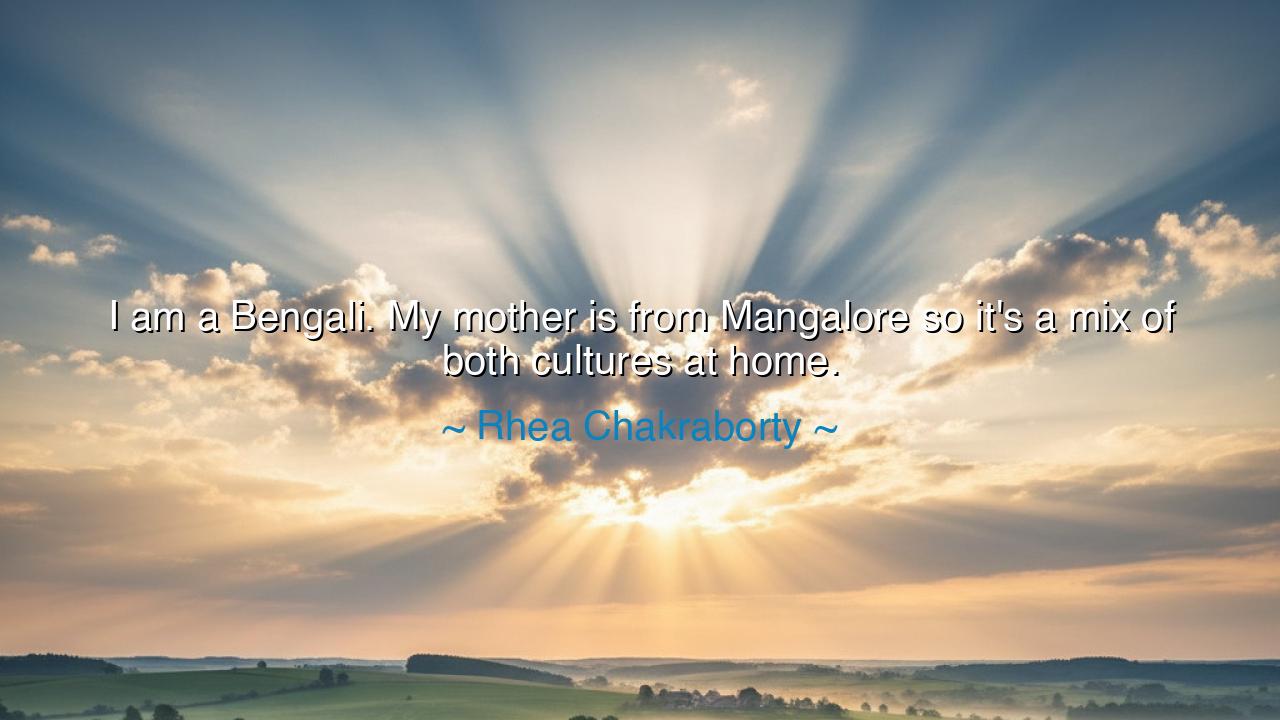
I am a Bengali. My mother is from Mangalore so it's a mix of both






In the gentle and rooted words of Rhea Chakraborty, we hear the echo of an identity woven from two worlds: “I am a Bengali. My mother is from Mangalore so it’s a mix of both cultures at home.” Though spoken with simplicity, these words contain a profound truth about the nature of heritage, belonging, and the unity of difference. In them lies the story of countless souls who are born at the crossroads of traditions—who carry within them not one rhythm, but many; not a single tongue, but the harmony of several. It is a reminder that identity is not confinement, but expansion—a blending of roots into something new, living, and beautiful.
The ancients taught that a person is the sum of their origins and their choices—that while blood gives us a name, spirit gives us depth. To be born of two cultures, as Rhea is of Bengal and Mangalore, is to live with a tapestry of languages, cuisines, songs, and customs intertwining like rivers meeting in the sea. The Bengali heart, known for its poetry, passion, and love for art, merges with the Mangalorean soul—grounded, spiritual, and rich with coastal simplicity. Within such a household, every celebration becomes a dialogue of traditions: the fragrance of fish curry blending with coconut and rice, Tagore’s verses echoing beside the hymns of the South. It is not confusion—it is harmony, the music of coexistence.
This blending of identities is as old as civilization itself. The great city of Alexandria, founded by Alexander the Great, was built on the same principle—it became a place where Greeks, Egyptians, Jews, and Persians met, lived, and learned from one another. There, philosophy met mysticism, art met science, and humanity grew richer through exchange. Just as Alexandria stood as a bridge between worlds, so too does every family that holds more than one heritage within its walls. In this way, Rhea’s home becomes a living Alexandria—where each meal, story, and custom reminds us that identity is not a single color, but a radiant spectrum.
But to live at the meeting of cultures is also a test of balance. The world often demands that we choose one side, that we declare a single allegiance. Yet the wise know that truth is larger than such divisions. When Rhea says, “It’s a mix of both cultures at home,” she speaks with quiet defiance against the pressure to simplify oneself. She reminds us that the self is not a line to be drawn—it is a circle, encompassing all that has shaped us. The ancient Indian philosopher Chanakya once wrote, “A tree with roots in many soils will never thirst.” So it is with those who inherit more than one tradition—they grow wide and generous, capable of understanding difference because they carry it within.
There is great strength in multiplicity. Those who belong to more than one culture are often the first to see that the world’s divisions are illusions. They understand that behind the diversity of dress, language, and custom, all human hearts beat the same rhythm of love and longing. In their homes, the child learns early that there is more than one way to pray, more than one song to welcome dawn. And this understanding, born from experience, becomes a gift to the world—a lesson in empathy and inclusion that no classroom can teach.
Think of Emperor Ashoka, who, after witnessing the horrors of war, embraced Buddhism and began to unite his empire not through conquest, but through compassion. Under his reign, India became a land of many faiths and languages living in peace. He built roads not just for trade, but for ideas to travel. Rhea’s acknowledgment of the “mix” within her home carries the same quiet power: it is an act of unity, a personal empire of harmony built not with swords, but with acceptance.
The lesson, then, is clear: cherish the cultures that live within you, and never apologize for being a blend of many worlds. Do not let anyone reduce your heritage to a label—wear it instead as a garland woven from many blossoms. If your roots stretch into different soils, let them feed your compassion and curiosity. Share the songs of one land with the people of another; teach your children the beauty of difference. For in this divided age, the world needs bridge-builders—those who can speak in many voices yet remain one at heart.
So, dear listener, remember the wisdom in Rhea Chakraborty’s words: identity is not about choosing, but about embracing. Be proud of the many strands that form the fabric of who you are. Let your life, like hers, be a home where cultures meet, where traditions do not clash but dance together. For when you honor every part of your heritage, you honor the whole of humanity—and in doing so, you remind the world that we are all, at our deepest level, a mix of many homes.






AAdministratorAdministrator
Welcome, honored guests. Please leave a comment, we will respond soon